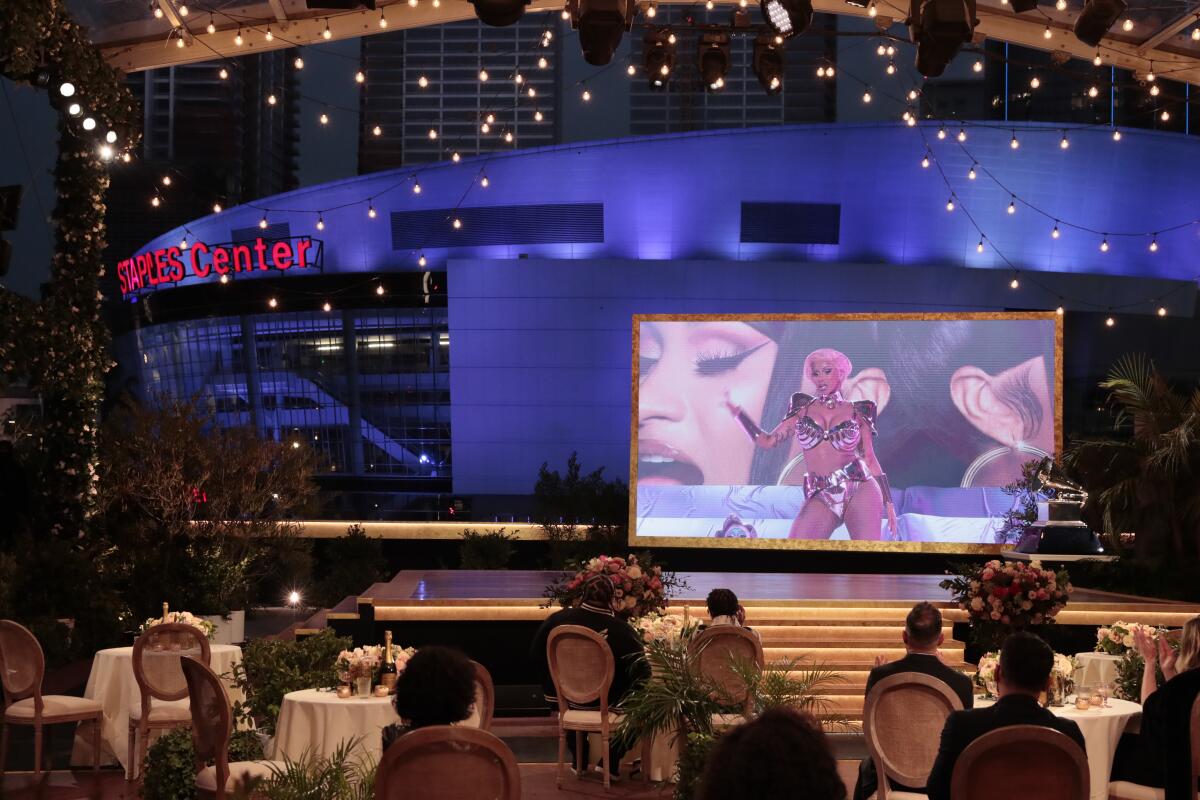Feedback: Were the Grammys’ Cardi B and Meghan Thee Stallion too sexy for TV?

- Share via
Empowerment or degradation?
Regarding “Yes, Beyoncé Made Grammys History, but the Recording Academy Still Failed Her” [March 15]: Mikael Wood called the raunchy show by Cardi B and Meghan Thee Stallion during the Grammy Awards ceremony “delightfully bawdy.” Speaking as a Christian, it deserves to be condemned.
Their performance of “WAP,” in which they wore almost nothing, opened their legs and simulated sex on a bed, was borderline pornographic and disgusting. It was completely inappropriate for a program families would be watching on prime-time television.
Who in their right mind would call this stuff “female empowerment”? It was female degradation, turning women into objects of lust.
The values of our society are rather twisted. It’s perfectly OK in our cancel culture for Dr. Seuss to be censored, but people cheer this type of sleazy show as something good. What a sad commentary.
John D. Wagner
Altadena
::
I was wondering if any Calendar writers were offended by the hypersexualized women on the Grammys? Are the mostly naked women who are gyrating, and objectifying their bodies onstage, really good for women, particularly at this place and time? Is “WAP” the proper anthem for women to celebrate?
Aren’t the women of the Grammys just as guilty as the men for commercially exploiting their own bodies for money and fame? They give cover and excuse and legitimacy to people like Harvey Weinstein, who have said that many women slept with him to further their careers. It’s not only men who objectify women, but many women are complicit in exploiting their own bodies for fame and fortune. They hurt women too.
Dan Jones
Rancho Santa Margarita
Woody Allen’s critics and defenders
I just read Lorraine Ali’s commentary about the backlash from the “Allen v. Farrow” documentary [“Allen’s Defenders Were Ready to Rail,” March 17] and wanted to write to support her.
I think the piece was well written and it is a message that needed to be put out there. I know she is getting a lot of negative feedback from Allen’s supporters, and I wanted to let her know that she has a lot of supporters out there too, even if we are not as loud as Allen’s.
Terri McClain
Fairfax, Va.
::
Some people who have reviewed the facts don’t believe that Woody Allen, in the midst of the most acrimonious celebrity divorce of the 20th century, sped at 120 mph from Manhattan to Connecticut, grabbed a child, ran her up to an attic, raped her, ran back down the stairs, handed her off to a maid, jumped in his car and drove back to Manhattan at 120 mph for dinner. Are these merely people “used to a world where women were merely told to shut up?”
This is applause-grabbing, sing-to-the-choir stuff, but can you really believe it?
Are you going to join the chorus of people who don’t honestly care if he did it or not, because, you know, patriarchy.
Matthew Wilder
Beverly Hills
Please retire that outdated term
Regarding Christie D’Zurilla’s article “Why Steven Yeun, not Yul Brynner, Is Oscars’ First Asian American Lead Actor Nominee” [March 15]: The world has changed since 1985 when the Times published Yul Brynner’s obituary.
At that time the use of the term “Gypsy” was accepted. The word is used to describe a person from the Romani people, which is a particularly marginalized group.
The word is an offensive slur. The Times should adopt a style rule that addresses this.
Miriam Billington
Santa Monica
::
Reading an article by a white woman writer about what counts as “Asian American” in any context should be approached with caution and skepticism. So I while I appreciate any article that speaks to the Asian American experience in California, I think D’Zurilla has managed to trivialize this topic and also denigrate individuals whose background reflects many cultures, such as Yul Brynner.
D’Zurilla ineptly muddles through a description of Mr. Brynner’s heritage, which I ironically found to be the most interesting part of the whole article. His background is a mixture of European and Asian cultures, which reflects how races and cultures are interwoven in central and northern Asia.
Brenda Ching
Irvine
A second opinion on Dickinson
Regarding: “Calendar Feedback: A Missed Diagnosis” [March 14]: The letter about Emily Dickinson indicates that she had “frequent and violent” epileptic seizures, as if such speculative details were part of the poet’s standard biography.
But they have only one source: Lyndall Gordon’s “Lives Like Loaded Guns: Emily Dickinson and Her Family’s Feuds” (2010).
The epilepsy allegations are carefully considered and refuted by Norbert Hirschorn and Polly Longsworth in “Was it Epilepsy?: Misdiagnosing Emily Dickinson (1830-1886),” published in the journal Perspectives in Biology and Medicine in 2013.
Leigh Clark
Granada
More to Read
The biggest entertainment stories
Get our big stories about Hollywood, film, television, music, arts, culture and more right in your inbox as soon as they publish.
You may occasionally receive promotional content from the Los Angeles Times.











